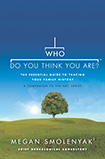Preparing for your ancestor hunt
Who Do You Think You Are?
For many, the first instinct is to jump on the computer, but if you can discipline yourself to do a little offline sleuthing beforehand, you'll ultimately go a lot further a lot faster.Investigate the clues you've probably got tucked away in your attic, closets, and basement and call your older relatives (think of them as witnesses to your family history), and you'll avoid getting stumped or derailed early on.
Where Do You Want to Go?
A useful starting point is to ask yourself what you hope to accomplish. Do you want to learn more about the origins of your surname or everything you can about your family tree? Is your goal to identify all eight of your great-grandparents, all sixteen great-great-grandparents, or as many ancestors as possible?
Many are simply curious about the entertaining stories that might be found dangling from the branches of their family tree. ... Finding an ancestor who missed the Titanic because of illness or helped build the Erie Canal will suddenly produce an insatiable thirst for knowledge about topics that seemed beyond tedious in your high school history textbooks. How long will all this take? That's up to you. There's always another ancestor to research if you feel like it, and many enjoy the thrill of the hunt so much that they never want it to end.
Go on a Treasure Hunt
Now's a good time to rediscover your own home. Most of us are clueless about all the treasures and tidbits lurking in our closets, drawers, basements, and attics. Many a genealogist has been chagrined to finally determine an elusive ancestor's name after a year of research, only to find this same information in a suitcase of papers tucked into the corner of their own cellar. One of the best possible hauls? A stash of old letters--bonus points if they still have their envelopes with precious names and addresses. Other items to keep your eyes open for include:
Birth, marriage, and death certificates
Newspaper clippings, including obituaries and wedding and anniversary announcements
Naturalization and citizenship papers, including passports and visas
Religious records (e.g., baptismal, Bar Mitzvah, etc.)
Family Bible
Diaries and journals
Photo albums (especially photos with the name of the photography studio imprinted or details written on back
Heirlooms such as engraved items, samplers, and quilts
Living Libraries
Once you're done looking through Mom's attic, you might want to sit down and talk with her. For that matter, if you have any relatives even twenty minutes older than you, stop reading right now and pick up the phone! What these living libraries can tell you off the top of their heads can shave months off your research time.
You'll want to give some thought to your questions in advance. There are plenty of resources to help you develop a list of likely topics, and the more specific you can be, the better; Older relatives often take the information that lives in their brains for granted and have a tendency to assume you already know what they know. Out of consideration, they'll try to avoid "boring" you, so you can easily wind up missing all sorts of genealogical gems.









